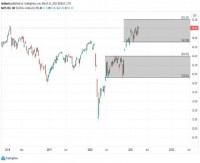|
Opalesque Industry Update - Given the hedge fund industry's lackluster performance in 2016 and the significant amount of hedge fund firms that closed their doors, many institutional investors have been revisiting their allocations to hedge funds. As many investors question whether actively managed investments are worth the management costs associated with them, there has been some rejiggering taking place as some institutions have begun shifting their allocations away from actively managed investments in favor of passive investments such as ETFs. Yet, as the U.S. economy continues its recovery and a new presidential administration promises a more pro-business approach that could benefit a historically cyclical industry, now may not be the best time for institutions to pull their support from hedge funds. To see how the alternative investment community believes the hedge fund industry is poised to perform over the next few years, The New York Hedge Fund Roundtable recently surveyed its membership about the topic. The state of the hedge fund industry was the subject of one of the Roundtable's most recent events, where Mark Yusko, the founder, CEO and CIO of Morgan Creek Capital Management discussed his thoughts on several of the issues of most concern to the industry at the moment. "The death of active management has been greatly exaggerated. Four times in my career hedge funds have 'died,' active management has died and value investing has died," said Yusko, noting that the industry was first declared 'dead' when it had $300 billion in assets under management, then again at the $600 billion mark, then at the $1.2 trillion mark and now at the $3 trillion mark. While Yusko believes the industry will continue to grow, he is concerned with the current shift toward passively managed investments. "Twenty years ago you couldn't measure the percentage of passive money as a percent – it was sub-1%, but today it is 40%," said Yusko. "And the most egregious of it is this thing called smart beta, which is an oxymoron because it just doesn't exist. Smart beta is great marketing, but it is not a real thing," he said. Roundtable members believe that assets under management within the hedge fund industry will continue to grow. At the same time, however, Roundtable members believe there will be additional consolidation within the industry and that investor pressure will push fees away from the current 2 and 20 standard, to a 1 and 20 structure. "The performance of hedge funds is being criticized by those who compare performance against index and long only investment products. Hedge funds, however, were never designed to compete with long-only products. As risk mitigation and capital preservation vehicles their value is most realized when there are adverse market conditions. So in a way they can be compared to insurance," said Timothy P. Selby, Chairman of the New York Hedge Fund Roundtable. "No one likes to pay for insurance, but when disaster hits the insured consider their policies one of the best investments ever made." New York Hedge Fund Roundtable members had the opportunity to weigh in on the state of the industry at one of the Roundtable's most recent events, as well as through an online electronic poll. *Of the respondents to this survey, 32% were fund managers; 14% were allocators; 8% were risk management or trading; 39% were service providers; and 7% were other industry participants. Following are some of the key findings of both surveys:
|
Industry Updates
Alternative investment industry foresees lower fee model & contraction of hedge fund firms over next few years
Monday, February 27, 2017
|
|





 RSS
RSS








